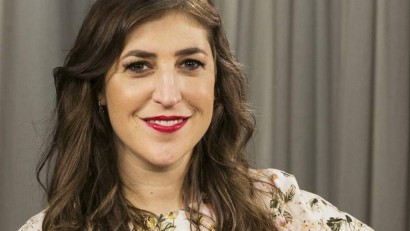Anderson, Bialik: self-defense can take many forms
I’ve hesitated to write much about the sexual harassment scandals that have rocked the worlds of entertainment and media this year. First, no shortage of ink has been spilled on the subject and second, although I believe it’s positive that women are standing up for themselves, I also think some important practical truths are being neglected in the discussion, and raising them feels risky.
But I believe in free speech, and open discussion, and not being silenced.
The aftermath of The New York Times’ and New Yorker’s explosive coverage of sexual harassment allegations against Harvey Weinstein and legions of men in entertainment, media, and government, and the “#Me, Too” movement, has produced an atmosphere in which individuals who have anything nuanced to say on this subject feel we can’t speak our minds freely. The reason? Women who do are widely attacked on social media as blaming the victim.
Given that the #Me, Too movement is anti-abuse and anti-harassment, this is deeply ironic. Harassment can take many forms.
And so, perhaps against my better judgement, I’m going to weigh in.
Along with everyone else, I’ve been very disturbed to read about the allegedly predatory behavior of men in the above-mentioned fields. More recently, I’ve also been disturbed by attacks on a few prominent women – Pamela Anderson, Mayim Bialik (pictured above) and Meryl Streep.
Dr. Bialik, who has a real-life doctorate in neuroscience, and stars in the hit CBS television series The Big Bang Theory, recently wrote a thoughtful, candid opinion piece for The New York Times, for which she was mobbed viciously online by many who savaged her looks and generally ripped into her, trying to cast shade on her feminism.
Anderson, who in an interview with Megyn Kelly stressed her pragmatic take on avoiding hotel rooms for purposes of discussing business, was also called upon to apologize for daring to suggest that self-defense for women can and perhaps should start with practical choices and good signaling/nonverbal communication. (For the record, Anderson has refused to apologize, and has said, “My position … doesn’t fall into line with the common herd or trend. I’m trying to tell women as a survivor of childhood abuse myself – it is important to be proactive as an adult who knows better – in defending themselves.”)
Anderson also recently said, “You know what you’re getting into if you’re going into a hotel room alone.” I’m not sure on that last point. From recent accounts, it’s emerging that some of these young women may have been manipulated and tricked and pressured. But I agree with Anderson’s point that, armed with sufficient self-confidence and worldly wisdom, there are decisions a young woman can make on the front end to reduce odds of finding herself in a bad situation or encountering, as Anderson said in her interview with Kelly, “dangers that lurk.”
One of the obligations of family and society is protection and education of the young, and in that spirit, one of the lessons being lost here is that older people – starting with girls’ parents—should warn them that they can take actions to reduce the likelihood of winding up in a particularly vulnerable position. Anderson mentioned on Instagram that “my mother taught me – protect yourself. Especially with my ‘image’ – she and I were worried it could give people the wrong impression.” So clearly Anderson had the benefit of strong parental guidance about what men were likely going to be after.
This excellent piece offers a mature, thoughtful, realistic perspective. Making sensible choices is, of course, no guarantee of protection against sexual or other types of harassment or worse. And there is absolutely no excuse for abuse, ever.
Since, for society to function, we are raised to conform and be obedient, it’s especially crucial to teach children to say “no” clearly, as well as to scream, make a scene, run, go to authorities, and never ever quietly acquiesce if an adult tries touch them inappropriately. We as a society finally know to teach them this.
Why then, are we clouding naive young women’s heads with feminist platitudes in place of common sense?
Frankly, those of us who’ve been around on the planet a bit longer than they have owe them honesty rather than cant about how they should be able to drink as much as they want, wear whatever they want, and go wherever they want, without having to worry. Of course they should. But this isn’t about how it should be in a perfect world. It’s about the way things go down in the real world.
In the real world, any woman over the age of 25 knows that when a man invites you – indeed, insists that you come, unescorted – to his hotel room, he’s hoping for something other than business. It’s also true in the real world that most predatory men’s targets are going to be women and girls under the age of 25, both because that’s what they would naturally prefer and because these girls are generally more easy to manipulate and/or intimidate.
Perhaps had someone – a parent, an agent – raised their awareness about what he surely had in mind some of these young women might have had the awareness and confidence to say, “No, Mr. Weinstein. I’m not comfortable coming to your hotel room to talk business, or for any reason. Let’s keep things professional.”
I’m glad that Pam Anderson and Mayim Bialik spoke up. And if a progressive movement (#Me, Too) whose stated purpose is the eradication of harassment can’t tolerate a little real talk without some of its adherents ganging up to conduct vicious ad hominem attacks on women for what they write, how far have we really progressed?




